Organized by Startup Sri Lanka, 30 June marked the momentous event when Seedstars kicked off the Colombo edition. MAS and the ICTA were also involved in making the event possible as the main sponsors.
This has been the drill for the Switzerland-based initiative’s Asian correspondence team as they comb through a new city every two weeks. Their last stop was in India the team shared and following the evening’s intense competition their next flight was to Hong Kong.
With 110 successful start-ups under their wing in just 4 years, Seedstars’ objective until August this year they say is to pick out regional talent. Each winning tech-startup team will then compete globally for an investment of 1 Million USD.
HypeHash
Starting the electrically charged evening off at Seedstars Colombo was team HypeHash. Presenting their unique take on “social shopping,” the team put forward an entirely hashtag-driven marketplace. This issue with trend-driven initiatives is their longevity or lack thereof, they explained using the ALS Ice Bucket Challenge to aid their case.
To capitalize on the short-lived popularity, HypeHash we understood is a digital market space for products designed with ongoing trends or trending topics. Buyers can search, rate, and purchase relevant designs while designers can use another facility to instantly create a product.
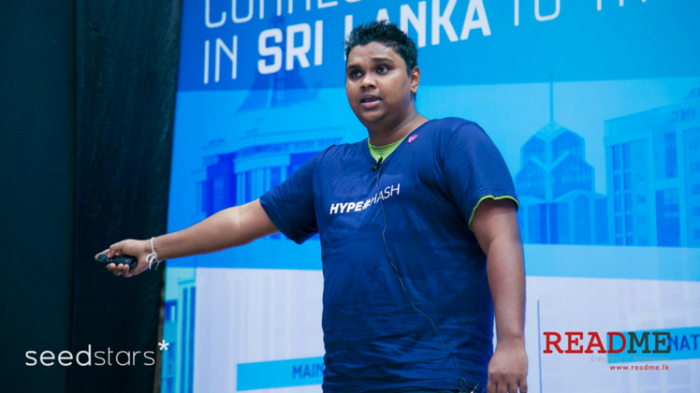
Very much a virtual model, “there’s no inventory” and products like “t-shirts or mugs” are only printed on-demand. Profits are split among the platform and designers. Responding to a question posed by the judges, they say returns are also possible and will go into auction.
Emerging winners at the recently concluded AngelHack competitions, “we’re just 22 days” in business. This hasn’t stopped HypeHash from attracting 206 designers and registered users. Indonesian backers have also shown some interest in the initiative and the team hopes to set up shop there as well.
Touristeun
Taking us a few centuries back from Seedstars Colombo was team Touristeun. Using “3D reconstruction” and a virtual builder-based component they managed to resurrect ancient Sri Lankan ruins. This VR simulation is even interactive we’re told: “you could ask a person within the VR tour how life in that century was like.” Guided tours are also possible in this virtual world without the human presence of a guide. It also allows the user to snap pictures and share them online, just like they would on any other vacation.
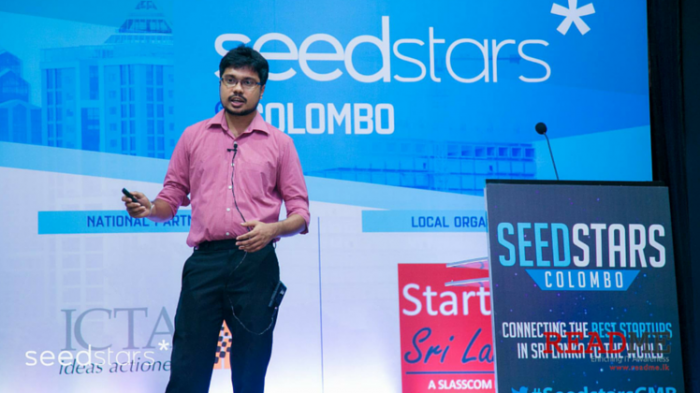
The base component of their product is free they say, but additional services like tours can be designed at a charge. Applications can also be purchased by museums and archives hosting the VR tours. Targeting each tour at 10 USD, the team has found that a viable market for this service will also manifest soon. “In the next 5 years, the Asia Pacific region is expecting around 8 million tourists.”
They’re working with the Tourism Promotions Bureau and the National Archeological Department to break in to the scene. Currently, they’ve managed to complete virtually reconstructing Sigiriya and plan to take on ruins in the Cultural Triangle next. “We even tested it out with tourists in Polonnaruwa.”
Katha
Next up was an app called Katha. “Audio should make a come-back” according to Katha’s creators if only just for the medium’s simplicity. “You can listen to content while doing other things” but this might not be the same for other audio content and features from merely being an interface’s subspace, Katha sets out to tackle issues faced by creators of such work.
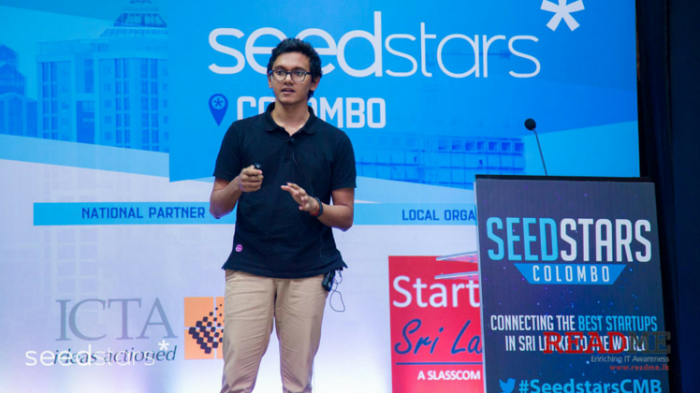
The platform will allow users to find content using hashtags and in the future nature of the content itself. They even hope to transport emoticons into audible form. Hosting is also a facility this platform will provide so content creators are not burdened with finding such services elsewhere.
In this company’s short life, “we’ve had over 200% growth from one month to the next.” Trusted content creators like “News First, and Ground Views” have thus far come onboard. Combined with the considerable traction they’ve managed the audio adverts slipped in-between content as a user sifts through content is to bring in revenue.
When asked at Seedstars Colombo if they’re simply replicating a local version of iTunes, they explained that content creation isn’t supported by Apple’s platform. “We’ll have an icon which will let you click and create” content, making the process as easy as surfing to discover other content from areas of a user’s interest.
Formal Addresses
At this point of Seedstars Colombo, Prime Minister Ranil Wickramasinghe made an entrance and was formally welcomed by the Chairman of SLASSCOM, Mano Sekeram.
Amid existing tech enterprises, as tomorrow’s hopefuls made their pitches at Trace City, Maradana “There’s no better place” the Chairman felt to house this event than Sri Lanka’s own version “of Silicone Valley.” As much as emerging markets are Seedstars’ interest he said SLASSCOM also had complete faith in the local industry’s potential.
Grateful for all the state support in pushing Sri Lanka to achieve this potential, he said: “the future of Sri Lanka is built-in innovation and tech.” Initiatives like Startup Sri Lanka he said were in line with the goal of seeing “1000 start-ups emerging this year” and pushing the local IT industry to be worth “5 billion dollars.”
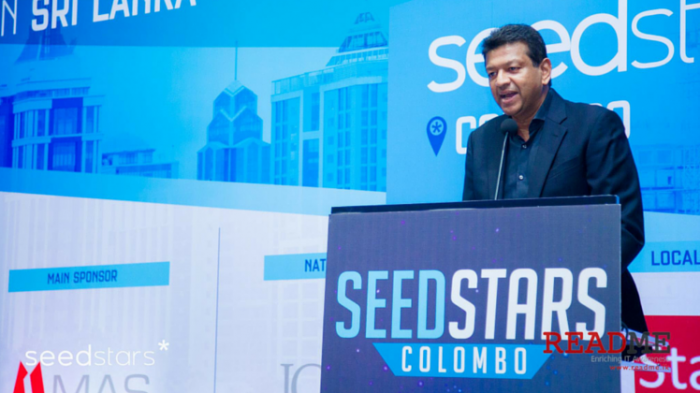
Alluding to Professor Klaus Schawb’s ideology that AI is the fourth industrial revolution he said, “We want Sri Lanka to clearly take part in this revolution.” An overview of the local start-up ecosystem studied by Startup Sri Lanka was ceremoniously presented to the Prime Minister. Later on in the evening Vice-chairman of SLASSCOM Ruwindhu Peiris further expanded on this by giving the gathering some stats.
The journey of re-writing the rules and “taking our destiny back into our hands” with respect to Sri Lanka’s export market is well underway he said. 96 % of entrepreneurs in the start-up game which will in the future feed our export market are male, while the remaining 4% are female.
Although globally the average age to diverge and set up a business is “around 35” at home, “58% of start-ups” are enterprises owned by those under 35. 68% of these are self-funded while 12% have been supported by family and friends and 15% by Angel Investors. There has been support by the government however in this department since now banks are open to granting non-collateral loans.
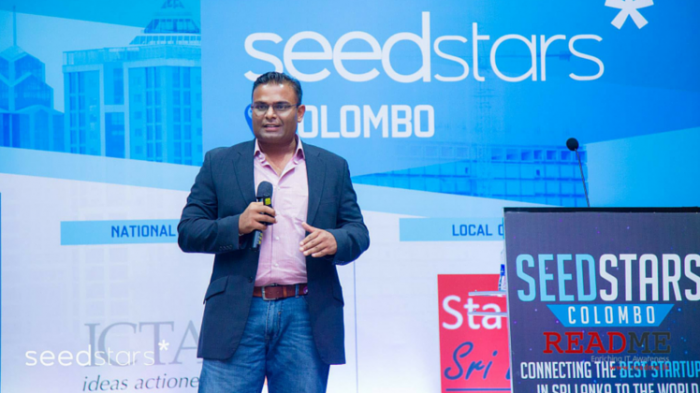
It was also found that 63% of the country’s entrepreneurs have not just made a lifestyle choice and “are after the big dream.” Revenue generation has been yet another burden faced by start-ups who find themselves having regional competition. “The issue isn’t the availability of capital,” he feels but is rather the ability to attract it.
Owing to collectives like SLASSCOM and the ICTA businesses are cropping up all around the country, not just in Colombo. Ideally, 60% of this growth should happen outside the already commercialized city he said, in order for it to be affordable for young companies to flourish.
He also spoke of the flipside- what investors are looking for. The trend he says shows a low number of investors, “around 2 per company” who are generally willing to dispose of anything from 1-10 Million Rupees. Impressed more than anything by the quality of management they see within a fresh sprouting organization, he felt having investors on board isn’t a bad idea. Being open to external funding provides some safety net to fail cheap and fail fast which provides imperative learning for start-ups.
Studies also suggest that specialization is key. “The more words you use to describe what you do- the less money you are likely to make.” Yet another facet to success if having affordable workspaces and regional reach, for which he felt competitions like Seedstars serve as launching pads.
Preview VR
“Buying a house is a one-time thing” the team behind Preview VR is convinced. “Once you buy it, you live with it.” Nothing compares to physically visiting one’s future property. In the event that isn’t possible, Preview VR allows a buyer to take a virtual tour of the space.
Their system translates architectural software currently in use into virtual-reality versions of the actual space. You could even change the interior’s colors and shift furniture around, view the location by day or at night time for an almost real understanding of the location.
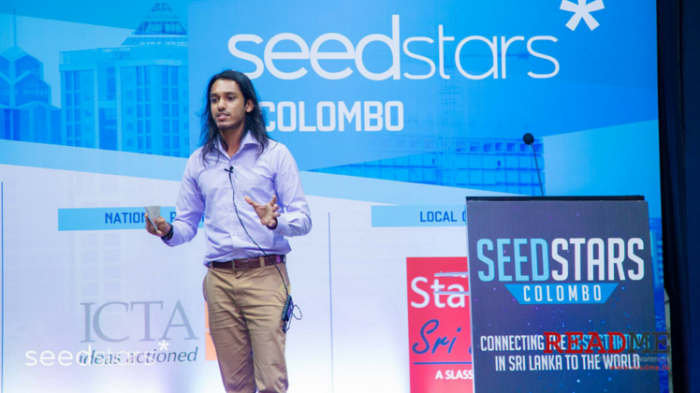
With over 36% of the world’s population armed with a smartphone and 40% of Colombo’s real estate buyers living overseas the team felt they’ve got a shot at an untapped market. Competitors do exist they told the judges, but none that is “operating in a domain-specific manner and offer customizable features.”
At present, the team shared at Seedstars Colombo that they’re working with a few apartment complexes in the country. The big dream they shared, is to meet Middle Eastern real-estate giants.
NicNac
In the running to represent Sri Lanka at Seedstars Global Summit was team NicNac. The mobile application we’re told is for “those who wished they had a clone…or butler.” NicNac is best described as a “digital butler.”
From ordering food to planning a wedding or simply making a donation, the app’s interface is a space for customers “to get creative with their requests.” Combining e-commerce and services, each request is transferred to an agent who for NicNac’s purposes are “called butlers.”
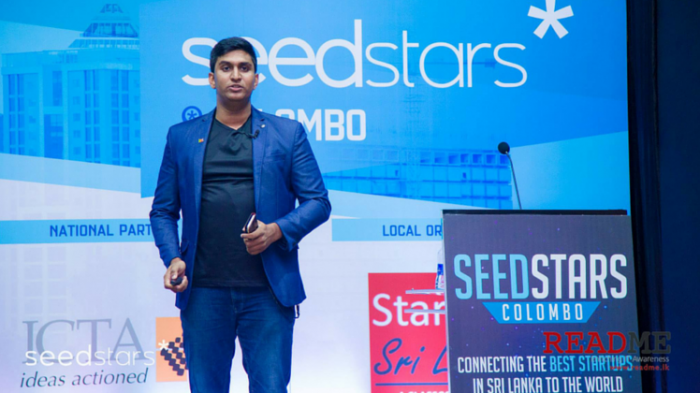
Each request is charged at “250 Rupees” and commissions from merchants are also charged. “We’re currently working with Brandix” and are hoping to carve out a subscription system at “99 USD a month.” In the past 2 months, however, they’ve managed 21,452 downloads. Built only for iOS the app has 25% of this number who are active customers and the team apparently carries out around 150 orders daily. As of late, they’ve even been delivering goods from Singapore.
Foodie
Foodie Global has found that “65% of restaurants fail after 4 years.” Irrespective of their location in the globe this reality springs for a number of reasons like poor management, unskilled labor, and poorly curated menus.
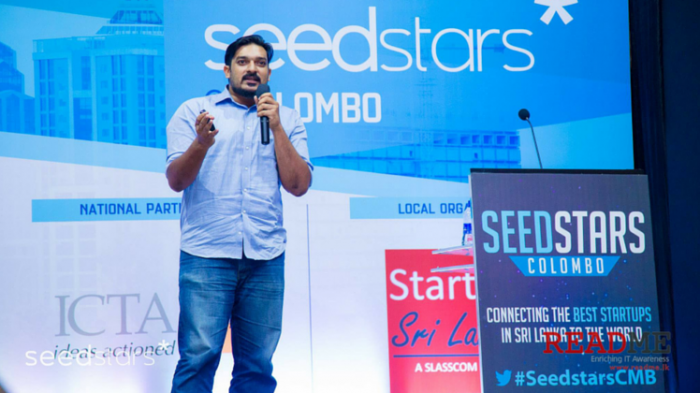
Foodie Global, however, has a recipe to fix this. An application Sri Lanka has known to be a source to order food online from also includes services like pricing strategies, budgeting and such for restaurant owners. Simply because the restaurant’s life results is a continuous flow of customers, which in turn benefits the delivery service Foodie runs, their focus is to keep food businesses running.
In less than 5 months of launching a logistics plan in Sri Lanka, the teams are happy to report that they’ve entered the stage of making a profit. “We keep our menus updated,” for the deliveries which on average take “41 minutes” including cooking time.
The success has enabled them to start operations in the Netherlands as well.
PayMedia
The main problem with local banks according to the team at PayMedia is the queuing. Limited work hours “from 9-5” result in difficulty when it comes to managing the expectations of the millennial generations.
In the fast-paced, convenience-prioritizing world not many can afford to stand in line while others have resorted to online banking completely. But this still won’t result in direct access to physical cash and PayMedia has the solution. Their innovation is a device that allows fully automatic or digitized banking- think ATM but with more features.
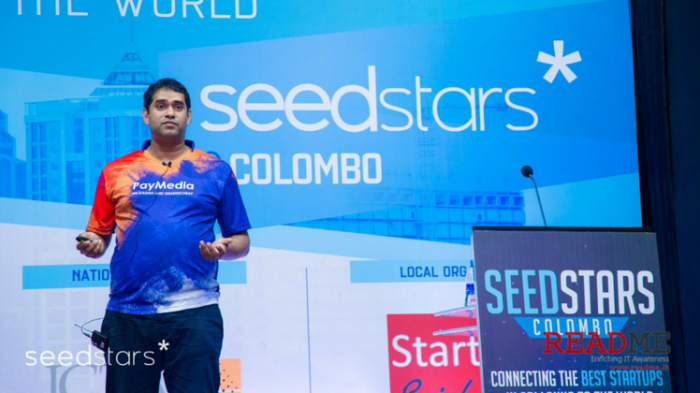
Currently “about 3 machines” are relied on in unison to deliver what Pay Media can with 1 device. “Services like withdrawals, deposits and even encashing cheques, automated loans and opening up new accounts can be done with just verification by a call center.
An ordinary ATM is built to comfortably handle “200 odd transactions a day.” PayMedia’s unit which is assembled in the island can manage double of this number. “At first only around 10 people a day” stopped by, but one they recruited “some undergraduates” to guide passers- by initial apprehension wore off and now they record “around 420” transactions.
LAYUP
Last but not the least by a long shot at Seedstars Colombo was team LAYUP. This platform is for anyone who can attest that training sessions in certain companies can be more confusing to digest than helpful.
Instead of going about training in a management-centric manner this system is fixated on “turning this back on its head” for a learner-centric situation. It comes down to the user experience, and instead of leafing through entire PDF documents or binders, employees can have easy access to content “which we can make interesting.”
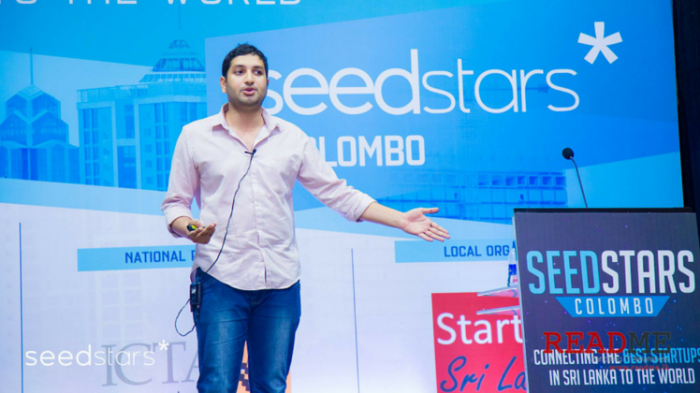
While the content is customizable according to the organization LAYUP is working with, additional services like making the content reader-friendly are also on offer. Interactive methods like rewards and recognition variables, usage of games, puzzles and questions and social, peer-supported learning are supported by this innovation suggests it is more likely to be a telling measure of an employee’s progress.
“Everyone who went to school” can agree they felt, that exams are not the only or even best method of measuring knowledge. For this reason, LAYUP will index performance based on the user’s interactivity, time spent on the application and other relevant criteria.
In a market where people are spending from 200-100,000 USD to keep themselves educated and in the know, this system can give access to information for as little at 100 USD.
Winners of Seedstars Colombo and the evening’s end
Head of HR at MAS Innovate, Zahara Ashraff also spoke to the crowd at Seedstars on why corporates like the one she represented immerse themselves in the projects they undertake and how tech plays a vital role in what they do. Diversity, she disclosed is the key to efficient problem-solving. Despite the company’s corporate presence “we like to surround ourselves with those who bartend, or DJ” in their free time or “moonlight as sportsmen.”
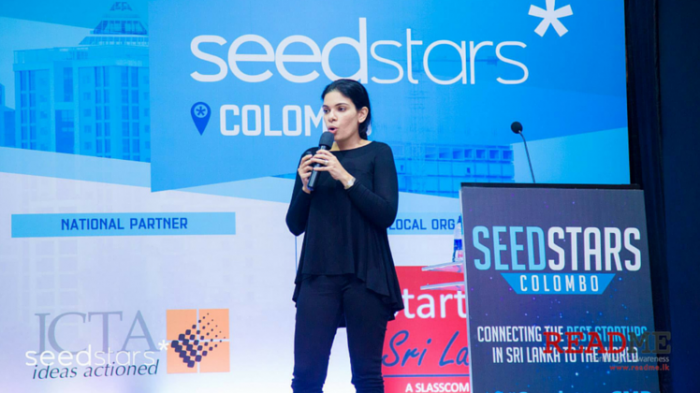
The entire endeavor we felt was impeccably captured in the short address by Seedstars’ local correspondent- Mangala Karunaratne, CEO of Calcey Technologies. It’s clear he said “that we have an agenda- to change maids from Sri Lanka to made in Sri Lanka” and these are just the preliminary stages of that journey.
Coming in at third place was Katha, second place was snagged by NicNac and the winners with a chance to represent Sri Lanka in the Regional and Global Summits of Seedstars was team LAYUP.
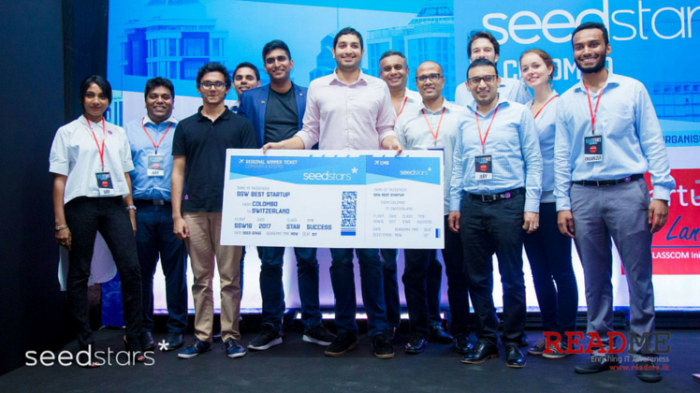



GIPHY App Key not set. Please check settings